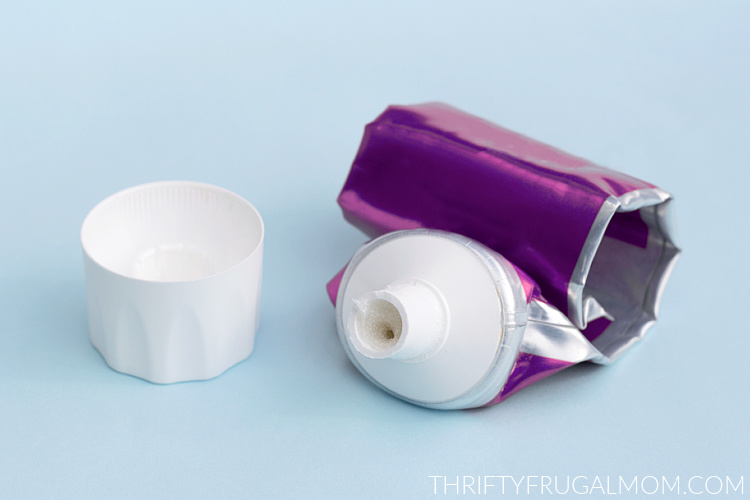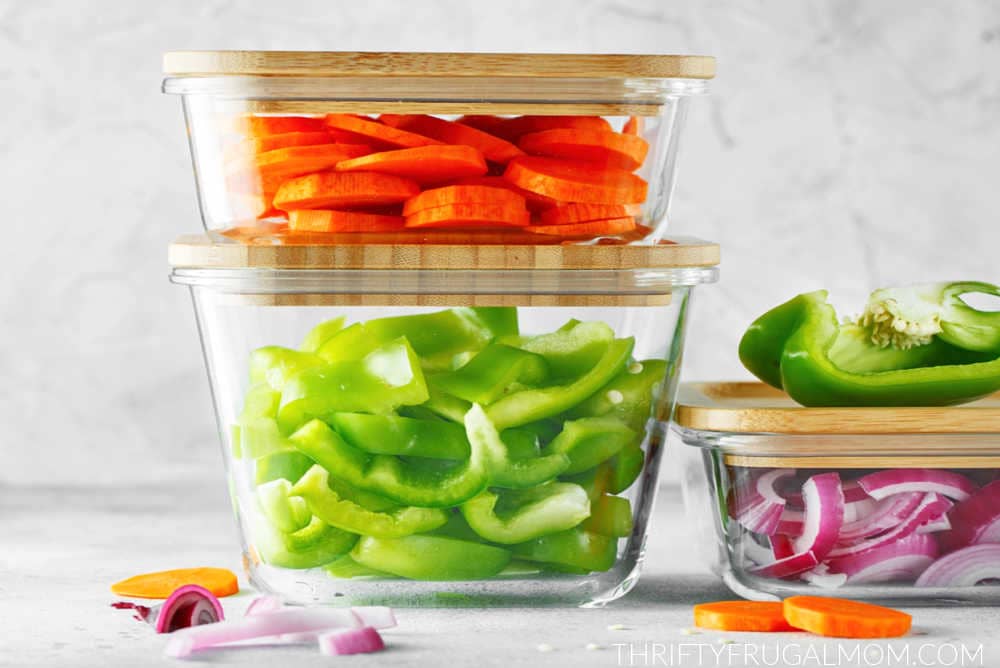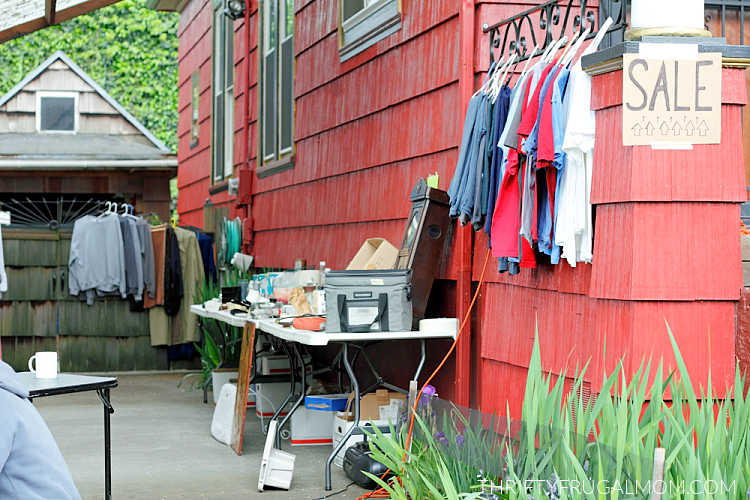Hate the idea of wasting money? Check out these commonly overlooked ways that people frequently do just that. And find out just how easy it is to make changes to save money instead!
There are affiliate links in this post – please read my full disclosure policy. As an Amazon Associate, I earn from qualifying purchases.
None of us wants to waste our money. And yet, we all do things regularly without thinking about it that aren’t exactly frugal.
There is hope though! Many of the common money wasters are really quite simple to fix.
25 Ways You Might Be Wasting Money and What to Do Instead
1. Not Fully Emptying Containers
It’s amazing how much you can still get out of “empty” containers by simply using a small spatula.
Along the same lines, if you cut open things like lotion and toothpaste tubes, you’ll be surprised at the amount of product that is still inside. This is especially true of any kind of pump container as the pump tends not to be able to fully empty the bottle.
2. Taking Expiration Dates as the Law
If you are tossing food the moment it hits the date on the package, you are wasting money!
Nearly all food is still safe to eat after the “expiration” date.
In fact, you’ll notice that many packages actually use the words “Best if Used By”, “Sell By”, or “Best By Date”. This simply means that the food should be sold by that date and that the brand won’t guarantee the quality is 100% after that.
It is almost always still okay to consume the food for at least a couple more days. You may note a slight change in texture or that the food loses a bit of flavor, but unless it looks bad, smells bad or tastes off, it is generally fine to still eat.
Read more: Food Expiration Dates…What to Know
3. Wasting Food
An average American family of four throws out around $1,500 worth of food a year. That is a lot of money!
A few things that will help lower this amount:
- Be more mindful about buying only what you need.
- Keep an eye on fresh foods and make a plan to use or freeze it before it spoils.
- Store food in clear containers so you can easily see what you have.
- Serve smaller portions (especially to kids!), while making it clear that it’s okay to get seconds if anyone wants more.
- Meal plan so you know exactly what you will eat and need.
Get my FREE $50 Aldi Meal Plan here! It has 7 easy dinners for a family of 5.
4. Buying Name Brand
Did you know that many store-brand items are actually made by the same company as the name-brand alternative? They simply need to charge more for the flashier packaging and all the advertising that they do for the product.
Why not try some store brands and see what you think? You’ll probably always have a few name-brand items that you just simply love. But you may be happily surprised to discover that you can’t tell any difference and it’s such an easy way to not waste your money!
5. Buying Snacks at the Gas Station
Gas station snacks and drinks are notoriously expensive and are an easy way to waste money quickly!
Instead, take your own snacks with you on road trips and always keep a few in your vehicle so you can easily grab one if you get hungry or just feel munchy.
6. Taking Long and/or Super Hot Showers
Did you know that reducing your shower time from 20 minutes to 10 minutes can save you around $0.44? {Source}
That might not seem like much, but if you shower daily that would be a savings of $160 a year! And of course, if you like the water really hot, that amount will only increase.
Full disclosure: I may be frugal, but I love taking super hot showers, although they are rarely longer than 15 minutes. It’s an area that I choose as a deliberate splurge since it’s one of the easiest ways for me to decompress and relax.
7. Forgetting to Return Unwanted Items
This is one that sneaks up on me occasionally and always leaves me feeling frustrated with myself because it feels like such a simple thing to avoid.
A couple of things that help make it easier to remember to return an item before the store’s return window is over:
- Try to do all online returns right away.
- Have a specific spot where you put all returns and then check it regularly before leaving to run errands etc.
- Put a reminder in your databook or phone for a couple of days before the return window ends.
- Depending on the situation, put the item in the front seat of your car so you are forced to see it and be reminded.
8. Flying with Checked Luggage
If you are flying with an airline that doesn’t offer free checked luggage, going with carry-ons only will save you $30 or more per person!
We pretty much never pay for checked bags. And while I’m more of a be-prepared-for-anything packer, I have to admit that I’ve discovered that most of the time, I rather like the simplicity that traveling with just carry-ons brings. Plus, you don’t need to worry about lost or delayed bags either!
9. Having Unused Subscriptions
It feels like there are subscriptions for everything anymore- from subscription boxes to cloud storage to Ebook/audiobook services to Netflix, Hulu and Disney Plus.
And, if you aren’t careful, it’s so easy to spend hundreds a year on subscriptions you are not even using!
Thankfully, there’s an easy solution. Every few months, take several minutes to look over your bank and credit card statements and identify subscriptions that you no longer use and then cancel those subscriptions.
10. Using Paper Towels
Paper towels can be rather expensive, especially if you are buying heavy-duty ones. Instead, cut up old towels, sheets, and t-shirts and repurpose them into reusable cloth rags that you can use over and over.
Although we haven’t totally eliminated paper towels in our household, they typically only get pulled out for the greasiest spills or most germ-filled messes.
11. Not Doing Your Own Simple Repairs
Next time your car needs some basic maintenance or an appliance stops working, consider trying to take care of it yourself instead of calling a professional.
There are loads of helpful tutorials on blogs and Youtube and it’s amazing what all you can learn to do! Thanks to those, we’ve been able to fix our washer several times, do various car repairs, take care of a broken boiler and more!
12. Not Unplugging Electrical Things
Are you leaving electronic devices plugged in when they are fully charged or turned off? Turns out that they still are using electricity (known as phantom power or standby power).
According to the US Department of Energy, this phantom power costs the average household as much as $100 a year. {Source}
Reduce that amount by unplugging devices and appliances when they aren’t in use. Using power strips can be super helpful for turning off multiple electronics at once.
It also might be helpful to know that some of the biggest phantom power offenders are TVs, printers, computers/laptops, gaming consoles, speakers, microwaves and coffeemakers.
13. Not Taking Advantage of Employer Matches
According to a 2021 study by Magnify Money, 12% of Americans that are eligible for employer 401(k) matching don’t take advantage of it. That’s a lot of free money being left on the table!
If your employer offers a retirement savings plan, check to see if they also match contributions. If they do, it’s one of the easiest ways to “make” some extra money to put toward retirement!
14. Buying Pre-Cut|Individually Wrapped|Single Serve
Pre-sliced cheese, pre-cut fruits and vegetables, pre-made salads, already cooked and sliced chicken, single-serve packs of chips…they all can be really convenient but they will also cost you a lot more!
Instead, buy a larger bag of chips and divide it into small Ziploc bags for single serve portions. And take a few minutes to slice a block of cheese, cut up your own produce, throw together your own salad and cook some chicken. You’ll love the savings!
15. Not Using Reusable Water Bottles
Studies have proven that, in most areas, bottled water isn’t any different than tap water. So you are not only wasting your money buying it but all those plastic bottles are bad for the environment too!
Buy a reusable water bottle and fill it up with water from home instead. If you want filtered water and can afford it, we have used and recommend both this under-the-sink water filter and this countertop water filter.
16. Shopping Without a List
It’s way too easy to impulse buy if you don’t have a specific list of items that you need to purchase. Always make a list, even if it’s just a quick one on your phone’s notes app.
17. Not Researching Purchases
I can’t tell you how often I’ve scrolled through reviews and discovered that an item wasn’t going to be quite what I wanted after reading other people’s experiences.
Taking a few minutes to look over customer reviews on Amazon or Googling the item you are thinking of buying and looking for a website that has done a review can help you make your purchases wisely!
Pro Tip: On Amazon, make sure you look at the most recent reviews as sellers there often change the product in the listing and initially get great ratings but then swap it with a cheaper quality item.
18. Paying Bank Fees
Thankfully, bank fees are fairly easy to avoid. Skip ATM fees by only using ATMs that are affiliated with your bank. If that isn’t possible, get cash back by making a purchase with your debit card.
Avoid overdraft fees by keeping a minimum amount in your account at all times to give you a bit of a cushion in case there is a transaction you forgot about. If possible, set up account alerts so you get notified if your account balance dips below a certain amount.
If you are paying an account maintenance fee, look into switching to a bank that offers free checking/savings accounts or consider a credit union.
20. Always Buying New
My husband often says, “The moment an item leaves the store, it loses value.” A classic example of this is a new car losing 11% of its value once it’s driven off the lot.
We frequently buy things like Legos, books, bikes, clothing and even furniture and appliances used. And we’ve only ever owned used vehicles.
Obviously, thrift stores and yard sales are great places to look for items but we’ve also had success finding used items on Facebook Marketplace, Craigslist, Freecycle and eBay.
21. Buying Extended Warranties
I’m generally not a fan of extended warranties because often the hoops you need to jump through to take advantage of the warranty are more hassle than they are worth. Plus, there are usually clauses in the warranty contract that limit certain expensive or more common repairs, etc.
If you are considering purchasing an extended warranty, the FTC has some great guidelines to help you consider whether it’s worth it.
My personal choice is to instead budget a small amount each month to put aside to be able to use whenever something needs to be repaired.
22. Improperly Inflated Tires
Not only can underinflation lead to more wear on your tires and make them more prone to having a blowout, but it will also get you worse fuel mileage too!
The National Highway Traffic Safety Administration recommends checking your tire pressure once a month. Set a reminder on your phone or put it in your date book to make sure it actually happens.
Not sure how to check your tire pressure? Car and Driver has some tips!
23. Using Expensive Phone Plans
Gone are the days of needing to pay loads for a cellphone plan! Check out carriers such as Tello, Ting Mobile and Cricket to get inexpensive plans that will help you save.
24. Not Taking Advantage of Your Freezer
Many people don’t use their freezers as much as they probably should!
Here are some of the best ways to use your freezer to help you save:
- Freeze food that will go to waste before you get it used.
- Make double batches of recipes and freeze half to use on days that you are tempted to get takeout or eat out.
- When an item that you use regularly is on sale, stock up and freeze it to extend its shelf life.
Not sure what foods you can freeze? Likely lots more than you think! Check out this list of 40 Foods that Freeze Well!
25. Not Using a Reusable Coffee Cup
This one isn’t going to save you loads but it’s such an easy way to not waste your money that I had to mention it!
Many places give you a small discount for using your own reusable coffee cup when you buy a coffee. Not only does it save you money, but it helps reduce waste too!








Ann
Just this morning, I cut the end off of my face cream! It’s amazing how much product is still inside. Thank you for this great article.
Laura
Just a note on #25- my husband loves the idea of having a coffee when he is driving (to work, to church, to the store, or anywhere really). He isn’t crazy about reusable mugs though, and tends to lose them anyways. So, we buy Costco disposable to go cups and make our own coffee to take with us. Even though the cups aren’t free, at 25 cents apiece plus a few cents for our Homemade coffee we are still saving well over a dollar as opposed to driving through and getting a coffee. We are also saving our time and gas, as we live In a smaller town and wait time in the coffee shop drive thru is usually 5-10 min. I guess just to say that although it may not be as environmentally friendly, it is still a good way to save money.
Lydia Beiler
I love this, Laura! Yes, maybe it’s not as quite as frugal, but you are still saving money and doing it in a way that works for you. Sometimes good enough is better than doing nothing!